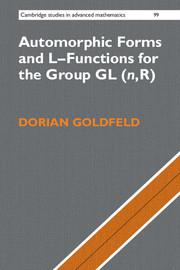Book contents
- Frontmatter
- Contents
- Introduction
- 1 Discrete group actions
- 2 Invariant differential operators
- 3 Automorphic forms and L–functions for SL(2, ℤ)
- 4 Existence of Maass forms
- 5 Maass forms and Whittaker functions for SL(n,ℤ)
- 6 Automorphic forms and L-functions for SL(3, ℤ)
- 7 The Gelbart–Jacquet lift
- 8 Bounds for L-functions and Siegel zeros
- 9 The Godement–Jacquet L-function
- 10 Langlands Eisenstein series
- 11 Poincaré series and Kloosterman sums
- 12 Rankin–Selberg convolutions
- 13 Langlands conjectures
- List of symbols
- Appendix: The GL(n)pack Manual
- References
- Index
12 - Rankin–Selberg convolutions
Published online by Cambridge University Press: 22 August 2009
- Frontmatter
- Contents
- Introduction
- 1 Discrete group actions
- 2 Invariant differential operators
- 3 Automorphic forms and L–functions for SL(2, ℤ)
- 4 Existence of Maass forms
- 5 Maass forms and Whittaker functions for SL(n,ℤ)
- 6 Automorphic forms and L-functions for SL(3, ℤ)
- 7 The Gelbart–Jacquet lift
- 8 Bounds for L-functions and Siegel zeros
- 9 The Godement–Jacquet L-function
- 10 Langlands Eisenstein series
- 11 Poincaré series and Kloosterman sums
- 12 Rankin–Selberg convolutions
- 13 Langlands conjectures
- List of symbols
- Appendix: The GL(n)pack Manual
- References
- Index
Summary
The Rankin–Selberg convolution for L-functions associated to automorphic forms on GL(2) was independently discovered by Rankin (1939) and Selberg (1940). The method was discussed in Section 7.2 in connection with the Gelbart–Jacquet lift and a generalization to GL(3) was given in Section 7.4. A much more general interpretation of the original Rankin–Selberg convolution for GL(2) × GL(2) in the framework of adeles and automorphic representations was first obtained in (Jacquet, 1972). The theory was subsequently further generalized in (Jacquet and Shalika, 1981).
The Rankin–Selberg convolution for the case GL(n) × GL(n′), (1 ≤ n < n′), requires new ideas. Note that this includes GL(1) × GL(n′) which is essentially the Godement–Jacquet L-function whose holomorphic continuation and functional equation was first obtained by Godement and Jacquet (1972). A sketch of the general Rankin–Selberg convolution for GL(n) × GL(n′) in classical language was given in (Jacquet, 1981). The theory was further extended in the context of automorphic representations in (Jacquet, Piatetski-Shapiro and Shalika, 1983). In this chapter, we shall present an elementary and self contained account of both the meromorphic continuation and functional equation of Rankin–Selberg L-functions associated to GL(n) × GL(n′). In particular, this will give the meromorphic continuation and functional equation of the Godement–Jacquet L-function.
The fact that Rankin–Selberg L-functions have Euler products is a consequence of the uniqueness of Whittaker functions for local fields.
- Type
- Chapter
- Information
- Automorphic Forms and L-Functions for the Group GL(n,R) , pp. 365 - 394Publisher: Cambridge University PressPrint publication year: 2006

